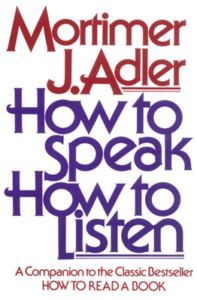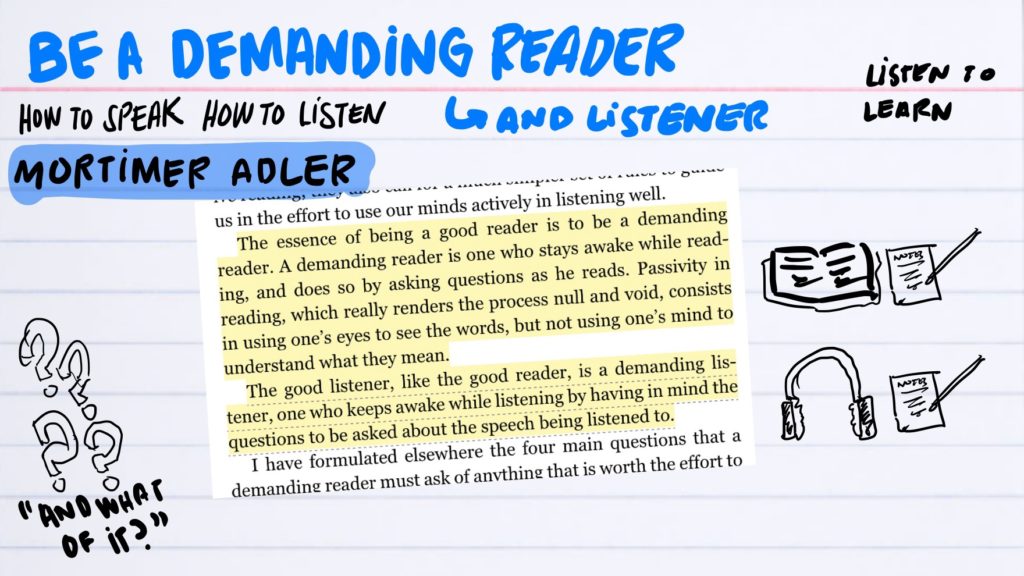
Check out the full notes for “How to speak, how to listen” by Mortimer J. Adler
Mortimer Jerome Adler explains how to get the most out of speeches and lectures in How to Speak How to Listen:
The essence of being a good reader is to be a demanding reader. A demanding reader is one who stays awake while reading, and does so by asking questions as he reads. Passivity in reading, which really renders the process null and void, consists in using one’s eyes to see the words, but not using one’s mind to understand what they mean.
The good listener, like the good reader, is a demanding listener, one who keeps awake while listening by having in mind the questions to be asked about the speech being listened to.
I spend a good amount of time each day listening to audiobooks and podcasts. I’m often listening to things with retention in mind. The next day I’ll sometimes find it difficult even thinking of what podcast episodes I listened to the day before. If I can’t do that then how can I expect to remember any specific takeaways.
- Start writing things down — The steps for listening follow the steps Adler explains in How to Read a Book. You take sets of notes. For books it’d be while reading and then reviewing things after reading to elaborate on things. For listening, you take notes while listening (or as soon as you can after if you can’t do it during for whatever reason) and then again to elaborate on the points that you have.
- Start asking questions — By having questions in mind while listening, you’ll be able to pull out answers. You should try as quickly as possible to get a sense of the overall structure of what you’ll be listening to. With a book, you would skim things. For a speech, hopefully the speaker provides the overview near the beginning. If it’s an audiobook, you can probably find the table of contents online. Depending on the piece, you should also know what point the speaker is trying to make. While listening, consider what parts you agree or disagree with. And when you’ve got all that, then ask yourself “and what of it?” Whether you agree or disagree, what will you do with the gained knowledge? Is there action you can take?
I’ve had an iOS Shortcut for the past year or so that prompts me for a source then a list of topics and then it creates a new note in Evernote. I’ve started using this more often recently (increased from 1-2 times a day to probably 3-5 times a day) to capture topics on the go. I’ve been trying my best to open the shortcut up whenever I finish a podcast.
I have a bunch of notes in a “Topics” notebook. The next step will be reviewing this notebook regularly. I might try to use Zapier to email a compilation of these each week or two.
This is aspirational but here’s the system I’d like to have:
- Write notes (Topics go into a “Topics” with iOS Shortcuts) — I’ve got this going. I can continue finding cues to add more notes throughout the day.
- Review notes (Reminders for now but eventually automated) — Just seeing the list of topics could be good. The iOS Shortcut I have allows me to pick a few of the topics as headers to fill in. This would be a good time to write some bullets for those main topics.
- Elaborate on notes (Blog posts) — When reviewing the notes, I’m guessing some will stick out a little bit more than the others. At that point I’ll grab an excerpt and write a post and schedule it.
